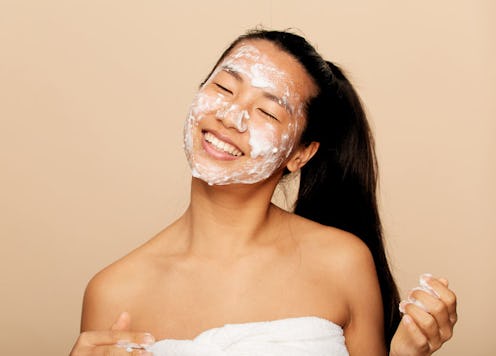Life
5 Unexpected Signs You Have Adult Acne & Didn't Realise It
I thought spots would be a thing of the past at this point of my life, relinquished to my teenage years along with Juicy Tubes and Tammy Girl T-shirts. And yet, I wake up with a red, inflamed bump on my face far more than I'd like. Sometimes, it's hormonal, and I can put it down to time of the month, or what I've eaten. But sometimes, I can practically play join the dots on my face. Sounds familiar? It could be that these spots are signs you have adult acne, which is a common but often misdiagnosed phenomenon.
Dr Mervyn Patterson, cosmetic doctor and founder of Woodford Medical tells me, "Acne results from a build-up of sebum and dead skin cells in the entrance to the skin pore. The skin starts to mount an inflammatory reaction to the area, which leads to a pimple forming, which can then develop into a full blown spot. Excessive levels of the male androgen are a major underlying cause."
The NHS reports that more than 80% of adult acne cases occur in women, and in 2016 The Telegraph quoted Dr Stefanie Williams, medical director of Eudelo, in saying it was "like an epidemic" among millennials. If you're wondering if your spots are just hormonal bad luck or something more serious, I've spoken the experts and put together five signs you have adult acne and didn't realise it.
1There's A High Quantity And Frequency Of Spots
Sadly, the odd spot really is just normal. Things like eating dairy, travel, and lack of sleep are all contributing factors, as well as hormonal shifts. "Spots are just a form of acne. Acne comes in several forms,” Dr. Stephen Kownacki, chair of the Primary Care Dermatology Society (PCDS), told Refinery29. But when you're breaking out regularly and severely, it may be time to consider it's something more serious.
2It Runs In The Family
"Studies show a strong link between genetics and acne, with four to five times greater likelihood of developing acne as a teen or adult if a first degree relative suffers from the condition," says Dr Daniel Glass, consultant dermatologist at The Dermatology Clinic London. It's not a guarantee, but if you see spots popping up, ask your parents if they suffered from acne. If they did, you could treat it more seriously, and get help for adult acne.
3If You've Made Lifestyle Changes & They Persist
Stress, poor diet, being overweight, pollution, and chemicals in make-up can all contribute to spots, says Dr Glass. So, if you've made efforts to lose weight, cut dairy and sugar, stop smoking, get some exercise, and change your make-up, but spots still persist, it may have more underlying causes. You may need to see a dermatologist, and should tell them you've already made these tweaks.
4If Your Spots Hurt
There are three types of adult acne, according to Adult-Acne. The most severe type is cystic acne, which produces painful, red, inflamed bumps that have dead skin and hair follicles trapped underneath. They often occur on the cheeks and chin. They shouldn't be squeezed, and are a symptom of serious acne that you should seek medical attention for.
5You Have A Hormonal Imbalance
Hormones, it turns out, are responsible for pretty much everything in the body. Adult acne is a symptom of conditions such as polycystic ovarian syndrome, and these spots often occur in a localised area such as down the side of the face. If you've been diagnosed with a hormone condition, this could explain the acne, and if you haven't, it's well worth a hormone check up at an endocrinologist before dismissing spots as nothing serious.
6
Overall, though, there's no need o panic. Adult acne is incredibly common, and there's lots you can do. First, stop over-exfoliating. "It can lead to problems such as shiny, red, swollen skin and the problem you are trying to avoid by exfoliating, acne!" says Dr Patterson. He also suggests developing a good cleansing routine which contains salicylic acid, and switching to mineral based make-up, as it doesn't clog pores. You could visit the GP and try antibiotics, but be wary: Dr Patterson says "lots of evidence now shows that they are losing their effect in acne," but retinoids can make a real difference. Try to keep calm, and carry on. You're definitely not alone.
